
The Nazi Party, officially the National Socialist German Workers' Party, was a far-right political party in Germany active between 1920 and 1945 that created and supported the ideology of Nazism. Its precursor, the German Workers' Party, existed from 1919 to 1920. The Nazi Party emerged from the extremist German nationalist, racist and populist Freikorps paramilitary culture, which fought against communist uprisings in post–World War I Germany. The party was created to draw workers away from communism and into völkisch nationalism. Initially, Nazi political strategy focused on anti–big business, anti-bourgeois, and anti-capitalist rhetoric; it was later downplayed to gain the support of business leaders. By the 1930s, the party's main focus shifted to antisemitic and anti-Marxist themes. The party had little popular support until the Great Depression, when worsening living standards and widespread unemployment drove Germans into political extremism.

The Weimar Republic, officially known as the German Reich, was a historical period of Germany from 9 November 1918 to 23 March 1933, during which it was a constitutional federal republic for the first time in history; hence it is also referred to, and unofficially proclaimed itself, as the German Republic. The period's informal name is derived from the city of Weimar, which hosted the constituent assembly that established its government. In English, the republic was usually simply called "Germany", with "Weimar Republic" not commonly used until the 1930s.

The German People's Party was a conservative-liberal political party during the Weimar Republic that was the successor to the National Liberal Party of the German Empire. Along with the left-liberal German Democratic Party (DDP), it represented political liberalism in Germany between 1918 and 1933.

The German Democratic Party was a liberal political party in the Weimar Republic, considered centrist or centre-left. Along with the right-liberal German People's Party, it represented political liberalism in Germany between 1918 and 1933. It was formed in 1918 from the Progressive People's Party and the liberal wing of the National Liberal Party, both of which had been active in the German Empire.
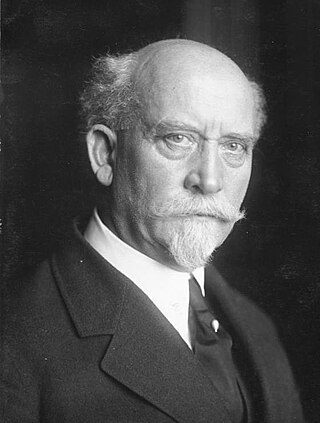
Philipp Heinrich Scheidemann was a German politician of the Social Democratic Party of Germany (SPD). In the first quarter of the 20th century he played a leading role in both his party and in the young Weimar Republic. During the German Revolution of 1918–1919 that broke out after Germany's defeat in World War I, Scheidemann proclaimed a German Republic from a balcony of the Reichstag building. In 1919 he was elected Reich Minister President by the National Assembly meeting in Weimar to write a constitution for the republic. He resigned the office the same year due to a lack of unanimity in the cabinet on whether or not to accept the terms of the Treaty of Versailles.
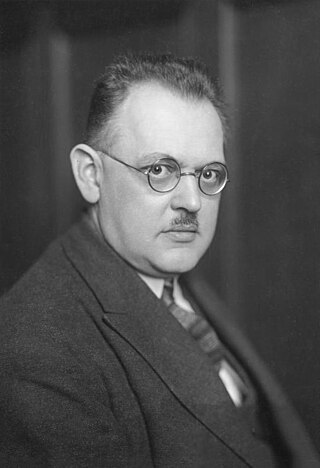
Hermann Müller was a German Social Democratic politician who served as foreign minister (1919–1920) and was twice chancellor of Germany during the Weimar Republic. In his capacity as foreign minister, he was one of the German signatories of the Treaty of Versailles.
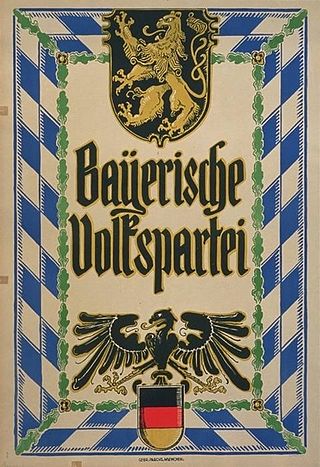
The Bavarian People's Party was a Catholic political party in Bavaria during the Weimar Republic. After the collapse of the German Empire in 1918, it split away from the national-level Catholic Centre Party and formed the BVP in order to pursue a more conservative and particularist Bavarian course. It consistently had more seats in the Bavarian state parliament than any other party and provided all Bavarian minister presidents from 1920 on. In the national Reichstag it remained a minor player with only about three percent of total votes in all elections. The BVP disbanded shortly after the Nazi seizure of power in early 1933.
The Conservative People's Party was a short-lived conservative and Christian democratic political party of the moderate right in the last years of the Weimar Republic. It broke away from the German National People's Party (DNVP) in July 1930 as a result of the DNVP's increasing shift to the right under the leadership of Alfred Hugenberg. It remained a numerically insignificant minor party but was represented in the governments of Heinrich Brüning (1930–1932). The KVP folded on 31 March 1933 after it ran out of funds.
In the fourteen years the Weimar Republic was in existence, some forty parties were represented in the Reichstag. This fragmentation of political power was in part due to the use of a peculiar proportional representation electoral system that encouraged regional or small special interest parties and in part due to the many challenges facing the nascent German democracy in this period.
These are terms, concepts and ideas that are useful to understanding the political situation in the Weimar Republic. Some are particular to the period and government, while others were just in common usage but have a bearing on the Weimar milieu and political maneuvering.

The Combat League of Revolutionary National Socialists, more commonly known as the Black Front, was a political group formed by Otto Strasser in 1930 after he resigned from the Nazi Party (NSDAP) to avoid being expelled.

The Christian-National Peasants' and Farmers' Party was an agrarian political party of Weimar Germany. It developed from the German National People's Party (DNVP) in 1928.

The Reich Party of the German Middle Class, known from 1920 to 1925 as the Economic Party of the German Middle Classes, was a conservative German political party during the Weimar Republic. It was commonly known as the Wirtschaftspartei or WP.
The Agricultural League or National Rural League was a German agrarian association during the Weimar Republic which was led by landowners with property east of the Elbe. It was allied with the German National People's Party and later the National Socialist German Workers' Party

The Weimar National Assembly, officially the German National Constitutional Assembly, was the popularly elected constitutional convention and de facto parliament of Germany from 6 February 1919 to 21 May 1920. As part of its duties as the interim government, it debated and reluctantly approved the Treaty of Versailles that codified the peace terms between Germany and the victorious Allies of World War I. The Assembly drew up and approved the Weimar Constitution that was in force from 1919 to 1933. With its work completed, the National Assembly was dissolved on 21 May 1920. Following the election of 6 June 1920, the new Reichstag met for the first time on 24 June 1920, taking the place of the Assembly.
The Reich Party for Civil Rights and Deflation, also known as the People's Justice Party, was a political party active in the Weimar Republic in Germany.
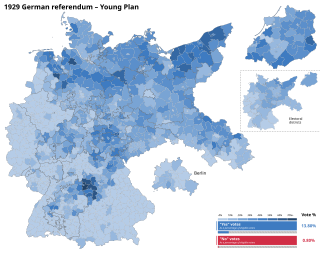
The 1929 German Referendum was an attempt during the Weimar Republic to use popular legislation to annul the agreement in the Young Plan between the German government and the World War I opponents of the German Reich regarding the amount and conditions of reparations payments. The referendum was the result of the initiative "Against the Enslavement of the German People " launched in 1929 by right-wing parties and organizations. It called for an overall revision of the Treaty of Versailles and stipulated that government officials who accepted new reparation obligations would be committing treason.
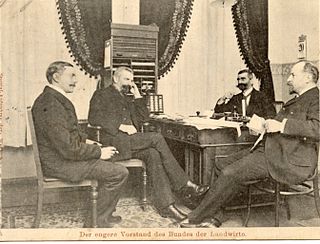
The Bund der Landwirte (BDL) was a German advocacy group founded 18 February 1893 by farmers and agricultural interests in response to the farm crisis of the 1890s, and more specifically the result of the protests against the low-tariff policies of Chancellor Leo von Caprivi, including his free trade policies.

The Papen cabinet, headed by the independent Franz von Papen, was the nineteenth government of the Weimar Republic. It took office on 1 June 1932 when it replaced the second Brüning cabinet, which had resigned the same day after it lost the confidence of President Paul von Hindenburg.
Simon Katzenstein was a German writer, politician (SPD) and political lecturer. During 1919/20 he was a member of the Weimar National Assembly, mandated to draw up a post-imperial national constitutions, and precursor to the parliament of a newly republican Germany.













